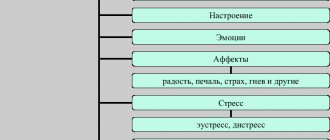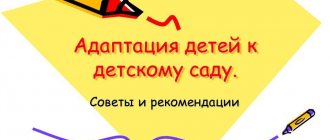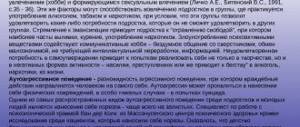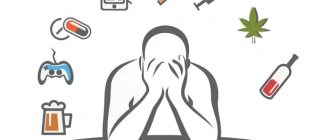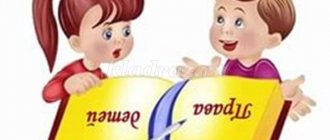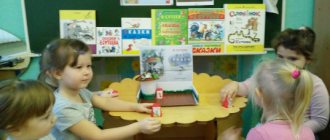Portrait of a modern teacher-educator
Ekaterina Bondarenko
Portrait of a modern teacher-educator
The teacher plays a vital role in the child's life by being sensitive to his needs and understanding his symbolic language, as well as monitoring the child's special needs in the group. It is the teacher who determines the child’s mood, his adaptation to the conditions of the preschool educational institution, his interaction with peers, and his productive activity. So what should a teacher be like these days?
1. modern educator must be clearly professionally competent. He must be able to solve professional problems and perform professional labor functions.
2. Must have a higher professional education (ideally)
or secondary vocational education in the field of preparation
"Preschool education and
pedagogy " , or higher vocational education or secondary vocational education and additional vocational education in the field of preparation
"Preschool education and
pedagogy " .
3. The teacher must be mobile. Modern society is rapidly changing and modernizing. Therefore, the teacher must be prepared for this. Must be able to adapt to new social conditions of his professional work. Then he will be valued as a professional, high-quality worker.
4. The teacher must be sufficiently competent in the educational and cognitive process. Could be able to apply their knowledge and skills in their professional practical activities. He must master the mechanisms of goal setting, planning his activities, analysis, reflection, and self-assessment of his successful activities. Know how to act in various professional situations. Also, the teacher must be able to independently search, analyze, select, process and transmit the necessary information to the subjects of the educational process.
5. In his teaching activities, the teacher must know and be guided by the following documents:
5.1. Labor Code of the Russian Federation,
5.2. Laws of the Russian Federation and its region;
5.3. The Charter and Internal Labor Regulations of the MBDOU and other local acts of the institution;
5.4. Internal regulations for pupils of MBDOU;
5.5. the Convention on the Rights of the Child;
5.6. The main general educational program "OOP"
and additional educational programs.
Orders, instructions of the head and higher education authorities, normative and methodological documents of the Government of the Russian Federation;
5.7. An employment contract and this job description;
5.8. The main provisions of the Federal Law “On Education in the Russian Federation”
.
6. The teacher must be communicative - be able to interact with the people around him, work together in group activities. Must love children, since we are considering a teacher, the teacher must at the same time be very kind to children, responsive and able to sympathize and worry about children's problems and experiences.
7. The teacher must be so competent with children that his knowledge, skills and abilities are successful in his professional activities, he is obliged (I think)
have individual – personal characteristics. That is, necessarily a creative, creative, proactive, independent person. I wanted to develop, self-realize and improve myself, set myself more and more new goals to achieve my professional excellence and qualities. Raise your professional bar.
8. Also, the teacher must be able to interact with children’s parents. From them, educators can obtain additional information about the interests, abilities, and characteristics of children. With mutual positive interaction with parents, their educational process has the best effect on children.
9. The appearance of the teacher must be impeccable: clothes are clean, tidy, hair is styled, make-up is exactly as much as necessary (you can’t overdo it, the perfume is not harsh, pleasant.
10. The personal qualities of a teacher are of great importance, since the teacher is an example for the child. Let’s consider the personal qualities:
10.1. Kindness and patience. And also justice, mercy, understanding and most importantly - love for children. These qualities, which determine a person’s humanistic orientation, are fundamental for a teacher.
10.2. High moral qualities. If the teacher himself does not possess the qualities that he teaches to children, then how will he teach them? teacher must monitor his actions, be honest with himself and the children, be responsible for his words, be open to children, and treat them with respect.
10.3. Organizational skills. The ability to plan, carry out everything consistently and clearly, and approach teaching activities comprehensively—these are qualities that will ensure the successful work of a preschool teacher.
10.4. Hard work. Working with children takes a lot of energy, but it is important to work with joy. If you love your profession with all your heart, it will be a pleasure to work.
10.5. Positive attitude. Children who are brought up in an atmosphere of goodwill and calm develop faster, grow self-confident, sociable, and emotionally open.
10.6. Ability to be creative. In kindergarten, you have to come up with a lot to make the upbringing and education of children as interesting as possible for them. It’s good when the teacher can do this easily.
Portrait of a modern schoolchild: expectations and realities
/data/edu/files/x1463909831.pptx (Presentation for the report “Portrait of a modern schoolchild”)
Introduction
Literature of the Soviet period and stories of older generations allow us to imagine the image of a Soviet schoolchild. His main life values were love and friendship, dignity and honor, conscience, kindness and responsibility. He was characterized by initiative and a desire for self-improvement. School graduates were confident in the future and in their need for society, so the motive for professional self-determination was public benefit.
But since then, high ideals have disappeared, and material well-being has become the main value in life. What is valuable to my peers today? How do they imagine their independent life? In our opinion, these are very pressing issues, because today’s schoolchildren are the future of our country.
The modern Concept of spiritual and moral development and upbringing of the personality of a citizen of Russia defines the national educational ideal of a highly moral, creative, competent citizen of Russia, who accepts the fate of the Fatherland as his own, aware of responsibility for the present and future of his country, rooted in the spiritual and cultural traditions of the multinational people of the Russian Federation.
You can see the hypothesis of our work, the object, subject and methods of research on the screen.
We began our research with a survey of graduates of 90 and 103 schools aged 16 to 18 years. We developed a questionnaire based on the one that the Russian government offers graduates. During the survey, 67 students were interviewed. There are practically no differences in answers among graduates of different schools, so the data is provided in a common dataset.
Already at the first stage, we rejected the hypothesis on which our work is based as erroneous.
And now we will present the results of our research and conclusions thereon.
The questionnaire consisted of five points, the first of which was the political orientation of youth
.
To the first question, the guys basically answered that they were following developments in the country, but, unfortunately, they were not interested.
None of the respondents said that he was satisfied with the state of affairs in the country.
When asked about their well-being, half of the students answered that their well-being depends only on themselves, and 37% - on living conditions and their own efforts equally.
In case of violation of their rights, almost half of the students are ready to contact law enforcement agencies, but no one is going to participate in protests.
Only a quarter of graduates declare their patriotism with complete confidence, while 44% are unsure of the answer.
And this slide presents an opinion on what it means to be a patriot.
Next item in the questionnaire: economic orientations of young people
.
A little more than a quarter of respondents say they are confident in the implementation of their plans for the future.
To the question: what does a successful career mean to a person? 73% believe that this is moral satisfaction from work and the opportunity to do what they love, but high income is also decisive.
But what influences your career? 88% believe that this is education, and 60% that these are personal qualities and character traits.
This slide shows that high wages attract young people to work most of all.
When applying for a good job, the guys almost unanimously answered that they could only rely on their own strength.
Of all the proposed areas for young people to work in, the most promising were identified by the guys as the area of the latest technologies. But the children's minimal preferences were given to education and healthcare.
We can conclude that the motivation for a teenager’s professional self-determination is the prestige of the profession and high earnings.
Next, let's talk about orientations towards education and development
.
Half of the graduates surveyed admit that they are trying to study normally, but studying does not arouse much interest in them.
As for graduates’ satisfaction with the quality of the education received, in general, graduates are satisfied with the education they receive.
When asked about life values, 75% of students chose family happiness as the most valuable. Next came health and the ability to benefit other people.
About participation in various projects, 42% of respondents responded positively.
Thus, we can draw a conclusion about the activity of young people in the field of scientific research and practical activities.
The next point in our questionnaire is ethnic and religious self-identification of young people.
.
The majority of young people have not decided on their attitude towards representatives of other nationalities, but almost a sixth of them are wary of other ethnic groups.
Only a third are ready to participate in the struggle for the interests of representatives of their nationality, while the rest are not going to participate in open conflict. In our opinion, the younger generation is not tolerant enough.
The final point of our health and physical development orientation questionnaire.
I am glad that among the children surveyed there are none who do not play sports at all.
An addition to the portrait of a graduate is his leisure time. Unfortunately, entertainment and social media are leading the way.
As for bad habits, everyone unanimously answered that bad habits have a negative impact on health.
Conclusion
In conclusion, we can now imagine the modern schoolchild. This is a young man whose main life values are health and family happiness. He is not very concerned about the morality of his actions, but has an idea of the ideal. The graduate is little concerned about the economic, social and political problems of his homeland. He strives for self-expression, enjoys self-development and self-improvement, leaving free time to communicate with friends. Thus, the young man is actively involved in the life of society. He views obtaining a quality education or a good job as a means to make a career and achieve high material well-being. The young man is not ready for an independent adult life, for unexpected difficulties, but he looks forward with optimism, since he can always count on the help of his parents. He is confident that the level of knowledge he received at school is high, which will help him when applying. And in order for a graduate of a modern secondary school to become a worthy member of society, it is necessary to prepare him to overcome all life’s difficulties.
The school administration became interested in the results of our research. In order to adjust educational work plans to eliminate the identified discrepancies between “expectations” and “realities,” we were invited to speak at the pedagogical council, which was held in March. And in May, elections were held for the chairman of the high school student council. Based on the election results, Polina Shubina, a student of grade 11 “A”, took over this position. The council began its work in September of the new academic year.
In grades 5-6, children's self-government has been introduced, and political information is held. Students are involved in active, socially significant activities.
Victoria Aleksandrovna Potapova, the mother of Serezha, who attends the senior group of our kindergarten, is a participant in the regional competition “Portrait of a Modern Teacher.” How does she see a modern teacher?“The teacher is a magician who
opens the door to the world of adults for children"
K. A. Helvetius
My name is Victoria, I am a mother of two children. My eldest daughter is 15 years old and my son is 5 years old. They visited the non-state preschool educational institution “Kindergarten No. 142 of the open joint-stock company “Russian Railways” in different periods of time, and I personally can compare the teacher of the 90s and our modern ones.
Outwardly, the teachers remained almost the same, but their “growth” and desire to keep up with the times is visible. The world is changing, children are changing, this, in turn, puts forward new demands for life and work with our modern children. Our teachers strive to master new modern technologies, which in turn help our children grow not only physically, but also mentally developed. Of course, I don’t want to say that children born in the eighties and nineties were deprived of anything in terms of upbringing and education. At that time in the development of our country, the educational process also kept pace with the times. But now, in the era of computerization, a modern teacher needs to use various achievements of science and technology (interactive whiteboards, tablets, computers, etc.) to satisfy the curiosity of a modern child and help him learn about the world around him. Of course, the computer is a new powerful tool for intellectual and creative development, but we must remember that it should only complement the teacher, and not replace him. Our teachers are good at this.
A modern educator must not forget that he must not only develop the child’s curiosity, activity, emotionality, responsiveness, form the prerequisites for educational activities, but also preserve his health.
I really want modern educators to work in a system that provides conditions for reducing hyperactivity in children, relieving anxiety and concentrating (solitude corners, moods, sand therapy, fairytale therapy, music therapy, etc.).
The problem of moral education remains relevant: environmental disasters, discord in the physical and moral health of people, lack of spirituality, revaluation of values, loss of moral guidelines of the younger generation, and society as a whole. And how kind and decent our children will be depends on the moral health of our society.
Making parents your allies is the main task of a modern educator.
A modern educator is a person who combines a psychologist, an artist, a friend, and a mentor. It should fill the child’s soul with meaning, shape children’s worldview and beliefs, awaken talents, and develop interest in a future happy, independent life.
If a person is proud of his work and the place where he works, then this feeling helps him move mountains; in his soul such a person is “building a temple”, and not just “cutting down a forest”. Socrates also said: “All professions are from people and only three from God: Teacher, Judge, Doctor.”
I believe that every child is perfect and born to grow, be nurtured and learn in love. “Love is a priceless gift. This is the only thing that we can give and yet you will still have it” - L.N. Tolstoy.
